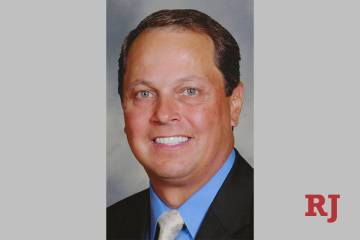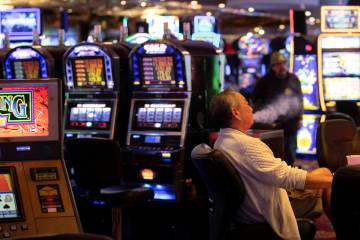Casinos deliver messages in Responsible Gaming Education Week
They entice you with flashing lights, bells and whistles, attractive hosts and inexpensive food.
They convince you to put money into a machine with the hope that, with a little luck, you’ll get more back. They test you with games of chance that rely on the turn of a card or the skill of an athlete.
But casino and gaming equipment manufacturing companies are pledged not to take advantage of people who go overboard in their rush to win a bundle.
This week, the industry is observing that promise with Responsible Gaming Education Week, which runs through Saturday.
“The American Gaming Association and its members prioritize responsible gaming as an integral part of our industry’s daily operations,” said Bill Miller, president and CEO of the organization representing the $261 billion U.S. casino industry.
Responsible Gaming Education Week “brings together industry, advocacy, regulator and other key stakeholders to promote transparency and gaming literacy while showcasing our everyday commitment to responsible gaming,” he said in a statement.
Panel at UNLV
The AGA is bringing that education to the UNLV International Gaming Institute at 9:30 a.m. Thursday with a panel of regional gaming representatives, academic experts and business leaders in a discussion on responsible gaming and efforts to advance evidence-based research on the issue.
The event comes at a time when millions of new gamblers have become a part of the market with the availability of sports wagering in 12 states in addition to Nevada with the repeal of the Professional and Amateur Sports Protection Act by the U.S. Supreme Court last year.
The event will highlight a new research fund led by the National Center for Responsible Gaming that will strive to advance the effectiveness of responsible gaming approaches and resources amid the expansion of legal, regulated sports betting.
When panelists discuss responsible gaming at UNLV, participants will include Sandra Morgan, chairwoman of the Nevada Gaming Control Board; Tammi Barlow, head of responsible gaming, for William Hill US; Elizabeth Cronan, senior director of gaming policy for the American Gaming Association; Alan Feldman, distinguished fellow with the UNLV International Gaming Institute; Jade Luchauer, corporate social responsibility manager, IGT; Virginia McDowell, independent non-executive Director, GVC Holdings; Paul Pellizzari, vice president of global social responsibility, Hard Rock International; Russell Sanna, executive director, National Center for Responsible Gaming; and Scott Warfield, managing director of gaming for NASCAR.
Other companies and organizations have their own observations related to Responsible Gaming Education Week.
Donations
Through a joint charitable venture, the Lasting Impact Philanthropic Initiative, the Association of Gaming Equipment Manufacturers and Gaming Laboratories International this week committed $200,000 to the Dr. Robert Hunter International Problem Gambling Center over the next two years.
“Because of this generous gift from our industry partners, AGEM and GLI, this money will have a direct impact on problem gamblers in our community,” said Stephanie Goodman, executive director of the center named for Hunter, the co-designer and director of the nation’s largest problem gambling inpatient treatment center.
Las Vegas-based Caesars Entertainment Corp. this year is honoring the 30th anniversary of its responsible gaming program. In recognition of the anniversary, Caesars is pledging more than $1 million to the National Center for Responsible Gaming and other third-party institutions in the U.S. and elsewhere to help shape the future of responsible gaming.
“Thirty years ago, Caesars Entertainment took the initiative to create the first responsible gaming program, serving our guests who could no longer play for fun,” said Jan Jones Blackhurst, executive vice president of public policy and corporate responsibility.
“We were determined to provide meaningful solutions for problem and underage gaming,” she said in a release. “Since then, we have continuously invested in cutting-edge research, training and technology to create a holistic program that respects the privacy of our guests who need our intervention.”
GameSense in Massachusetts
The Massachusetts Gaming Commission, which has research indicating that 2 percent of the state’s population — about 110,000 people — meet the criteria for problem gambling and 8 percent, or 440,000, are experiencing harm to a lesser degree.
The Massachusetts commission, in 2015, mandated the implementation of GameSense, a player-focused responsible gaming program that encourages players to adopt behaviors and attitudes that reduce the risk of gambling-related harm, by all licensees.
Companies that implemented GameSense include Las Vegas-based MGM Resorts International and Wynn Resorts Ltd. MGM took the added step of implementing GameSense companywide in the United States.
Contact Richard N. Velotta at rvelotta@reviewjournal.com or 702-477-3893. Follow @RickVelotta on Twitter.
Consumer principles for responsible play
The American Gaming Association recommends these guidelines to casino players to avoid problem gambling:
- Set a budget and stick to it. Responsible gaming means enjoying gambling as a fun and leisurely activity by playing for limited amounts of time — both in frequency and duration — and with a predetermined budget. You can establish your own limits by developing a set of personal guidelines to determine when and how much to gamble.
- Keep it social: play with friends, family and colleagues. Similar to shopping or attending a sporting event, gambling is a form of entertainment. Responsible gaming means playing in a social setting with family, friends or colleagues.
- Be informed: learn the details of the games you're playing. Use resources provided by gaming operators with information on the games you're playing and your odds of winning. For more information about game odds, you can always speak directly to a casino or gaming operator employee.
- Play with trusted, licensed, regulated operators. State-licensed and regulated gaming operators are committed to responsible gaming practices and ensuring that their staff are properly trained on responsible gaming policies. Illegal and unregulated gambling operators do not have any responsible gaming measures in place, placing consumers at heightened risk.





























